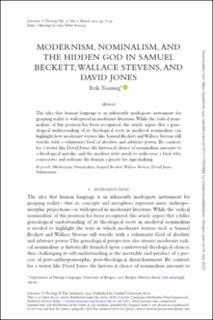| dc.contributor.author | Tonning, Erik | |
| dc.date.accessioned | 2023-07-06T08:58:48Z | |
| dc.date.available | 2023-07-06T08:58:48Z | |
| dc.date.created | 2023-06-05T13:29:36Z | |
| dc.date.issued | 2023 | |
| dc.identifier.issn | 0269-1205 | |
| dc.identifier.uri | https://hdl.handle.net/11250/3076518 | |
| dc.description.abstract | The idea that human language is an inherently inadequate instrument for grasping reality is widespread in modernist literature. While the ‘radical nominalism’ of this position has been recognised, this article argues that a genealogical understanding of its theological roots in medieval nominalism can highlight how modernist writers like Samuel Beckett and Wallace Stevens still wrestle with a voluntarist God of absolute and arbitrary power. By contrast, for a writer like David Jones, the historical choice of nominalism amounts to a theological mistake, and the modern artist needs to rediscover a God who consecrates and redeems the human capacity for sign-making. | en_US |
| dc.language.iso | eng | en_US |
| dc.publisher | Oxford University Press | en_US |
| dc.rights | Attribution-NonCommercial-NoDerivatives 4.0 Internasjonal | * |
| dc.rights.uri | http://creativecommons.org/licenses/by-nc-nd/4.0/deed.no | * |
| dc.title | Modernism, Nominalism, and the Hidden God in Samuel Beckett, Wallace Stevens, and David Jones | en_US |
| dc.type | Journal article | en_US |
| dc.type | Peer reviewed | en_US |
| dc.description.version | publishedVersion | en_US |
| dc.rights.holder | Copyright 2023 The Author(s) | en_US |
| cristin.ispublished | true | |
| cristin.fulltext | original | |
| cristin.qualitycode | 2 | |
| dc.identifier.doi | 10.1093/litthe/frac034 | |
| dc.identifier.cristin | 2151882 | |
| dc.source.journal | Literature & Theology | en_US |
| dc.source.pagenumber | 1-24 | en_US |
| dc.identifier.citation | Literature & Theology. 2023, 37 (1), 1-24. | en_US |
| dc.source.volume | 37 | en_US |
| dc.source.issue | 1 | en_US |

